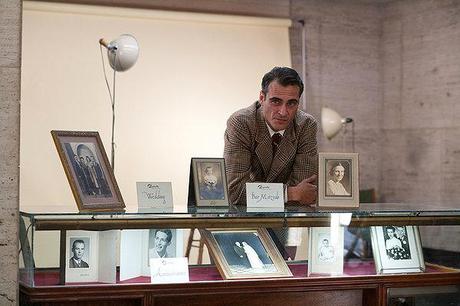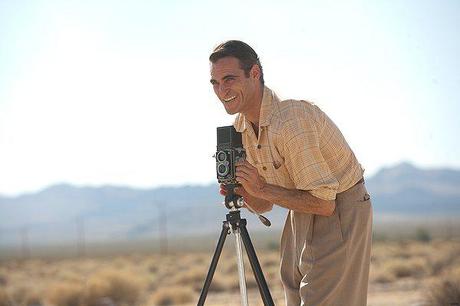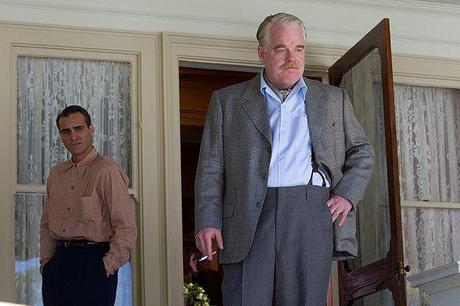An opening image of churning waters of an unknown force cause the volatility of the deep water to become restless and constantly moving. This image will come back several times during the viewing of Paul Thomas Anderson’s latest film, The Master. It isn’t revealed until later what causes the rift in the water, two different boats that are cutting through the seas, each one with a different purpose than the other, but both are on a journey that neither are aware of what waits for them. This is case file, a study about two individuals who are on a journey in which their paths will collide. Volatile, uncertain, constantly changing, the perfect ebb and flow for their meeting.

Make no mistake about The Master, from what you have heard about this film, it is a template for a commentary on Scientology. What that commentary is really about, I don’t know. It isn’t some grand scheme to polarize those about Scientology or the teachings of L. Ron Hubbard, but more a framework to showcase the study of the psychology between two individuals, a master and student, sheep and shepherd, father and son, whatever the correlation you want to make, it’s about an aimless individual and one who can provide the path. For me, that is the core of the film, a study about the external factors of our life.
Joaquin Phoenix plays Freddie Quell, a Navy sailor who is coming into a post-World War II time, afflicted with what we assume is PTSD. He is sent out into a world to essentially craft his own path, being told that he could find word picking produce, working in garage, owning a business, or a myriad of other boot strappy platitudes. He works as a portrait photographer, making bootleg hooch in the darkroom, getting drunk and chasing women until he lashes out in a violent manner. He moves on to a job gather cabbage, there he makes more of his choice poison, accidentally causing on the workers to become ill and runs away. Freddie drunkenly stumbles upon a ship that is about to weigh anchor and one can assume, something natural for Freddie to go back to. The boat belongs to, or is borrowed by, Lancaster Dodd played by Phillip Seymour Hoffman. An eerily spitting image of L. Ron Hubbard, Dodd is fascinated by this traveler whom fuels his writing and treatments. Dodd is known as The Master amongst his followers of a group called The Cause, a striking resemblance to that of The Church of Scientology.

The core of the film is focused on Dodd and Quell, the master and the student. But like Quell, the story drifts along the journey of the narrative. There isn’t some overarching story line, just a focus on the subjects and their give and take relationship. Quell is the romantic wanderer that Dodd is fascinated by and his attempts to control and diagnose Quell’s “problems” become his only goal. They need one another, some sort of weird yin and yang that only the two of them understand. Quell mainly goes along for the ride, drifting as he has done for most of his life and that is what is fascinating, we the audience aren’t sure what and where Quell is meaning to go. Dodd is trying to figure it all out, to give this man a purpose, a reason, and some control.
This dynamic could have been accomplished without the impeccable performances by Joaquin Phoenix and Phillip Seymour Hoffman. Phoenix makes an impressive return to the screen after is underrated, lauded role in the faux documentary I’m Still Here. His portrayal of Quell is both unsettling and ruggedly charming since his character, at the core, is a pussy chasing booze hound. I mean he lives his life without some form of restraint, casually making bootleg booze while propositioning women to fuck without a thought of civility. It’s the moments, or frequency, of his outbursts that unearth that troubled soul. Phoenix plays Quell with pure perfection, a man who seemingly is just always sliding down the knife’s edge of sanity before it cuts all the way through.
Hoffman turns in one of his best performances as Lancaster Dodd, the spitting image of Hubbard. He is pompous, controlling, verbose, inquisitive, but also troubled. Minor moments of rage show through when his methods are questioned and the butting of head between him and Quell only elevate the tensions between the master and student. Hoffman layers on the the complexity of a man who simply wants to unlock the great potential that humans have in life. A return to perfection as he puts it and Quell is his greatest student. When the two actors come together, nothing else matters in the film. You are locked in a dance between the two and each feed off of one another perfectly.
While the critics and people will be talking about Hoffman and Phoenix well into the awards season, they are supported by wonderful secondary characters, namely Amy Adams as Dodd’s wife Mary Sue. She embodies what Dodd hopes to bring out in his followers, that stern potential to be something more. And along with the characters, the film is anchored by stunning cinematography by Mihai Malaimare Jr. whose grandiose camera work keeps us alienated and distant from the reality of the characters. We get the feeling of aimlessly wandering along with Quell along the beaches and during the interactions between Dodd and Quell we are kept just slightly at a distance even though we are there with them in the room.

From a technical standpoint, this is one of the most beautiful movies of Anderson’s current filmography. Medium and long shots, paired with still and tracked shots. It isn’t the sweeping historical, period piece that requires this grand canvas that establishes the setting, rather we get very surgical and clean looking shots. The score by John Greenwood of the band Radiohead. His scores sets up this disjointed sound that doesn’t clue the audience to how they are supposed to feel during a scene. The music there to accompany the film and it does set up an atmosphere of confusion and intrigue.
Up till this point, I have been utterly praising the film and what it has to offer the viewer, but the it’s the subject matter between Quell and Dodd, along with the conclusion of the film that is a bit off putting. The movie does play out like a therapy session, one that indulges Anderson’s craft by keeping the audience from really getting involved with the main characters. This isn’t a traditional film in the sense of having a structured narrative, rather it’s a series of sessions and incidences that propel the film. Sometimes it isn’t divulged to the audience what is happening, only that we are supposed to sit there like a follower of The Cause and accept what is happening. I am not one to say that lack of a solid conclusion to this film is a negative, but for some viewers it might feel like a cop out and continuation of Hollywood’s trend of leaving the resolution up to the viewer, a cheap way to end a movie.
Then again the lack of a conclusion is sometimes a real thing that happens when presented with choices in real life. Dodd gives Quell choices and he does what he wants with them. It’s up to the traveler to do what he wants and for use, we have to realize that sometimes no resolution is a resolution. That is what makes this film complex and intriguing. It’s a study on the human psyche and what makes us who we are and how even presented with choices, we can choose to stay who we are no matter the influence.
I would rate this film as one of PTA’s top films, but his best. I still have an affinity for There Will Be Blood and Boogie Nights which were some the most mesmerizing films I have seen. The Master is an art film and one that will be remembered more for the performances by Phillip Seymour Hoffman and Joaquin Phoenix. That isn’t a terrible connection to have with this film as both men turn in award worthy performances. The complexity of these parallel travelers is what will have me coming back to the movie again and again, pacing over what I saw and trying to unlock the potential of this film, seeking its perfection.
Rating: 4.5 therapy sessions out of 5
*images via RottenTomatoes

